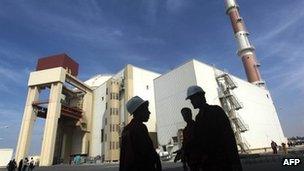UN nuclear agency IAEA: Iran 'studying nuclear weapons'
- Published
- comments

Russia helped Iran build its Bushehr nuclear power plant
The UN's nuclear watchdog says it has information indicating Iran has carried out tests "relevant to the development of a nuclear explosive device".
In its latest report on Iran, the IAEA says the research includes computer models that could only be used to develop a nuclear bomb trigger.
Correspondents say this is the International Atomic Energy Agency's toughest report on Iran to date.
Tehran condemned the findings as politically motivated.
"This report is unbalanced, unprofessional and prepared with political motivation and under political pressure by mostly the United States," said Ali Asghar Soltanieh, Iran's envoy to the IAEA.
It was "a repetition of old claims which were proven baseless by Iran in a precise 117-page response, " he added.
Iran says its nuclear programme is solely to generate civilian power.
The BBC's Bethany Bell, in Vienna, has examined the IAEA's latest quarterly report on Iran's nuclear programme.
She says the report gives detailed information - some of it new - suggesting that Iran conducted computer modelling of a kind that would only be relevant to a nuclear weapon.
The report, published on the Institute for Science and International Security website, external, notes that some of this research, conducted in 2008-09, is of "particular concern", our correspondent says.
"The application of such studies to anything other than a nuclear explosive is unclear to the agency," the report says.
'Credible evidence'
The report highlights:
Work on fast-acting detonators that have "possible application in a nuclear explosive device, and... limited civilian and conventional military applications".
Tests of the detonators consistent with simulating the explosion of a nuclear device
"The acquisition of nuclear weapons development information and documentation from a clandestine nuclear supply network."
"Work on the development of an indigenous design of a nuclear weapon including the testing of components."
The report continues: "The information indicates that prior to the end of 2003 the above activities took place under a structured programme. There are also indications that some activities relevant to the development of a nuclear explosive device continued after 2003, and that some may still be ongoing."
The report stops short, our correspondent adds, of saying explicitly that Iran is developing a nuclear bomb.
It says the information is "credible", and comes from some of the IAEA's 35 member states, from its own research and from Iran itself.
The report urges Iran "to engage substantively with the agency without delay for the purpose of providing clarifications."
'No serious proof'
Ahead of the report's release, there had been speculation in Israeli media about potential strikes on Iranian nuclear facilities.
A senior US official said Washington would look at applying more pressure on Iran if it did not supply answers to the questions raised in the report, Reuters news agency said.
"That could include additional sanctions by the United States. It could also include steps that we take together with other nations," the unnamed official said.
The UN Security Council has already passed four rounds of sanctions against Iran for refusing to halt uranium enrichment. Highly-enriched uranium can be processed into nuclear weapons.
China and Russia are unlikely to support further sanctions against Iran, the BBC's Kim Ghattas says in Washington.
Russia said the IAEA report had caused rising tension and more time was needed to determine whether it contained new, reliable evidence of a military element to Iran's nuclear programme.
Experts say Iran is at least one year away, perhaps several, from being able to produce a nuclear bomb. Some believe Iran's leadership wants to be in a position to able to produce such a weapon on short notice.